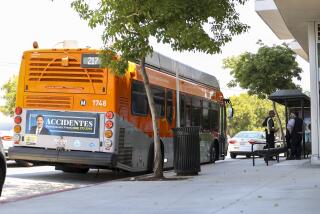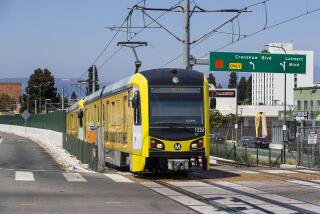Transit Panel to Consider Trolley Plan : Transportation: One of proposalâs electrified lines would link Burbank, Glendale and Pasadena to relieve congestion on the Ventura Freeway.
REGION â Transportation officials today will consider an ambitious countywide project that in the next few years would create 19 electrified trolley lines, including one that would link Burbank, Glendale and Pasadena.
Planners have proposed electrifying about 190 miles of bus lines in Los Angeles County. Construction of overhead wiring alone could cost as much as $1 billion, but transportation planners say that, by comparison, it is much cheaper than the per-mile costs of light rail and generates far less smog than current diesel-fueled buses.
The project is a joint effort by the Los Angeles County Transportation Commission and the Southern California Rapid Transit District. The RTD board meeting in Los Angeles at its headquarters today is scheduled to consider a recently completed draft environmental impact study on 12 of the proposed lines. If the board approves the study, copies will be available to the public beginning Friday.
Starting next week, community meetings about the project will be in locations such as Burbank, Glendale, Pasadena and Monterey Park.
Although the Nov. 3 defeat of the Proposition 156 rail-transit bond issue cast some doubts on the funding and speediness of such projects, transportation planners say they expect that the Burbank-Glendale-Pasadena line could be in place within two years.
The Burbank-Glendale-Pasadena line, intended to relieve congestion on the Ventura Freeway (134), would represent a combination of two current bus lines serving those cities and, according to Glendale Mayor Carl Raggio, would provide quicker service.
âWe donât have any east-west public transportation. We just have bits and pieces,â Raggio said, pointing out that in certain cases, to travel from Pasadena to Glendale or to Burbank, riders have to first go south to Los Angeles.
Raggio is one of 11 members of the RTD board and he heads the Tri-City Transportation Coalition, formed by Burbank, Glendale and Pasadena to remedy the citiesâ transportation problems along the east-west corridor.
Transportation officials, including Raggio, said they hope that President-elect Bill Clintonâs promises about funding for mass transit will benefit such electric bus-trolley plans.
âIf you listen to Clinton and believe what he has to say, then his term infrastructure does attend to what weâre talking about here with trolleys,â Raggio said.
Clara Potes-Fellow, a spokeswoman for the county Transportation Commission, said: âWe have great hopes in the new Administration. The commission is definitely going to go after the (transportation) dollars Clinton was talking about.â
Electric buses address two issues germane in Southern California: the need to reduce smog and to move large number of people.
âItâs hard to achieve both of those things,â said Albert H. Perdon, director of transit systems development for RTD. âThis fills that gap. But, yes, you do have to do it with wires.â
One of the main environmental benefits of the electric trolleys, Perdon said, is that they are virtually smog-free, especially when contrasted with existing diesel-fueled buses.
The trolleys will run on electric motors powered from specially constructed overhead wires running along the street. The buses themselves, transportation officials says, are âzero-polluting.â
A minimal amount of pollution would be created by the power plants, Perdon said. Even so, this would help RTD meet a deadline that the bus service operate 30% of its fleet with âzero-emissionâ vehicles by 2000.
The electric trolleys each cost $450,000, nearly twice the amount of diesel buses but with a life span twice as long.
County transportation officials and RTD have already authorized $19.4 million to begin a prototype of the electrified lines in downtown Los Angeles and Long Beach. Service is expected to start in 1993.
Raggio said he thinks that the tri-city line, with a potential minimum of 15,000 passengers daily, will be next in line after those two.
One drawback of the electric trolleys is the need for overhead wires, which have drawn complaints from officials in some cities where the lines are proposed, transportation officials said.
But Perdon said the aim of the project is to make the wiring compatible with the street setting and surrounding landscape. This is one of the issues, he said, addressed in the draft environmental study.
The goal of the trolley system, he said, is to improve the ambience of streets by making them âtransit-friendlyâ and oriented toward the user of mass transit. âWe want to make mass transit the mode of choice, rather than the mode of last resort.â He said landscaping on the lines and merging of the wiring with existing utility systems would be a priority.
Earlier this year, Los Feliz residents had objected to plans for an electric bus line there, saying the wiring would disfigure stately Los Feliz Boulevard. The line would have followed an existing bus route from Hollywood, through Los Feliz to Pasadena.
In March, the RTD board dropped the Los Feliz electric line and approved shifting its emphasis to the Burbank-Glendale-Pasadena line, which will cost $75 million for construction of the wiring and associated apparatus and travel a 15-mile path from Colorado Boulevard at Hill Street in Pasadena to Olive Avenue and Glenoaks Boulevard in Burbank.
Among the secondary proposals is the electrification of the line that runs along Valley Boulevard by the San Bernardino Freeway (10) throughout the San Gabriel Valley.
In recent months, officials from RTD and the county Transportation Commission have been meeting with city councils to discuss the proposed projects.
Following is a schedule of community meetings to be held locally:
Burbank: On Monday at the cityâs library auditorium, 110 N. Glenoaks Blvd. at 4:40 p.m. and 6:30 p.m.
Pasadena: On Wednesday at Wilson Middle School, 300 S. Madre St., at 4:30 p.m. and 6:30 p.m.
Glendale: On Thursday at City Hall, 613 E. Broadway, at 4:30 p.m. and 6:30 p.m.
In addition, on Dec. 15, the RTD has scheduled a public hearing on the project at its Los Angeles headquarters, 425 S. Main St.
More to Read
Sign up for Essential California
The most important California stories and recommendations in your inbox every morning.
You may occasionally receive promotional content from the Los Angeles Times.










